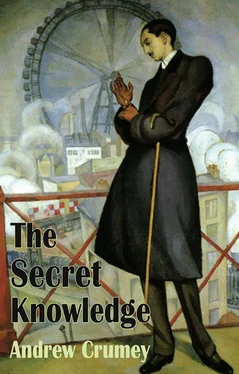Not enough, though, to expound on negative dialectics, even given the level of public interest, not after recent events, the student shot by riot police. Adorno made his lecture class stand for a minute’s silence in honour of the victim. One could call it a sentimental and therefore anti-philosophical gesture, like the Benjamin symposium with its tang of hero-worship, but the point was to recognise the significance of the present, not dwell on an invented past. Some of the students are speaking of a revolutionary moment, they say the Federal Republic is a fascist state, utter nonsense. They condemn a country where there are free elections and praise Mao for terrorising his own people. Their condition is despair, like Walter’s, but also, fatally, it is disillusion.
He should address the question they keep asking him. At one of his lectures a girl came and handed him a teddy bear, simply trying to embarrass him, and said to the audience, how is critical theory to become critical practice? Some applauded, others jeered, but the question dogs him. He is a thinker, a theoretician, but what the youth of today demand is action, any sort of action. Class struggle is a mythology that lies conveniently within their grasp. By asking people to think, he becomes identified with the forces of oppression.
He has been accused of suppressing or distorting Benjamin’s work because Benjamin was insufficiently Marxist, or else too much of a Marxist. His frantic and ultimately doomed efforts to give Benjamin research money and get him out of Europe are portrayed as manipulation, the arbitrary exertion of power. He has been a selective and partisan editor of their published correspondence. Let’s be honest about all this. If Benjamin had not killed himself then he would not be on the pedestal posterity has made for him. He’s like Anne Frank, a symbol that becomes a substitute for thought, a point of adhesion for pre-existing emotion. What of the forgotten? What of those denied even the status of concept?
He’s beginning to feel his age. Two tasks lie before him: his aesthetic theory, which he expects to be his most lasting work, and his book on Beethoven. Perhaps he should talk about one of those. As long as some bearded hippie doesn’t intervene.
He’s already asleep when Gretel gets back, doesn’t see her until next morning. Of course she’ll be coming to the symposium; how could she miss such an important event? She loved Walter too. But she hasn’t heard anything about the programme, nor can Teddie enlighten her. He understands it’s a university event, but the organisation of it has been ramshackle, he’s not even sure if it’s intended for academics or the general public. Somebody noticed the anniversary, that’s all. Felt it should be marked. Adorno’s publisher is possibly involved. Perhaps the entire thing is a marketing exercise.
It takes place that night; Adorno shows up and among the audience in the large, well-filled auditorium he sees at least three women with whom he has been romantically involved, a few others with whom he’d like to be. He’s expecting to give a lecture but the stage has a row of chairs behind a long table, microphones for half a dozen participants. Nobody bothered to tell him anything, explain what was wanted. There are many faces he doesn’t recognise, faces who appear not to recognise him.
A young fellow comes and shakes him by the hand, introduces himself as chairman for the evening, journalist on one of the left-wing newspapers. Can’t be any older than thirty, thinning hair and thick-rimmed glasses, an earnest demeanour that gives him the air of someone in fancy dress. Other participants materialise; a lecturer Adorno knows, a writer, a woman who’s apparently a film-maker, people from the margins of Frankfurt’s intelligentsia. Such eclecticism mirrors only the most unfortunate aspect of Benjamin’s endeavour. Adorno foresees a talk on Benjamin’s use of hashish.
Eventually it gets going; they all have ten minutes to make whatever claim they can on the public’s attention. The film-maker is planning a work based on Benjamin’s life; this is the first that Adorno has heard of the project, which strikes him as tasteless and banal, the epitome of everything to which Benjamin stood in opposition. The lecturer then uses his ration of time to speak about the student protests and police violence, asking what Benjamin would have thought of it and reaching no conclusion more illuminating than that Walter would have been as upset about it as everyone else in the room. He was, that is to say, one of us, an emblem like those Baroque images he discussed so penetratingly, whose captions can signify anything we want them to.
The writer’s offering is strangest and most outrageous of all: a story about Walter, a fictional depiction of the man Adorno knew personally, as though he were some legendary hero. This, thinks Adorno, is the limit point of historical sentimentalism; his gorge is rising even before he hears the first words of the story, the introduction is bad enough. Benjamin, the writer explains, was fascinated by the figure of Louis-Auguste Blanqui, and his theory that there are other worlds like our own, but with altered histories. Sheer nonsense, Adorno mutters to himself, barely concealing his words; Benjamin’s interest was a small and characteristically eccentric part of a far larger analysis of the conditions of nineteenth-century capitalism. And so, the writer continues, in a way that is I hope faithful to Benjamin’s insights, I have imagined how it might have been otherwise, if Benjamin had not died while fleeing from the Gestapo, but had instead escaped.
Adorno pushes back his seat, about to leave. The chairman stares at him, alarmed, and waves him to remain, a gesture that is both a request and a command. Adorno manages not to listen to the story, its inconsequentiality rendering it surprisingly easy to ignore, instead he looks at Ulrike, remembers her naked body when they made love, remembers every sound she made, and thinks how futile life is. In everything we do there is an element of exchange, and contemporary social relations, he reflects, are becoming subject to a devaluation far greater than what befell the Reichsmark nearly half a century ago. The result is a lapse into authoritarianism.
People are applauding that stupid story. Now at last it’s Teddie’s turn. He leans forward into the welcoming ambit of the microphone. “I knew Walter Benjamin,” he says. “More importantly, I have spent decades studying problems that engaged his thought. A man’s ideas, if they are at all original, are the property of no one, not even the man himself. To consider them such would be to deny them the autonomy that is their claim to significance. My intervention in Benjamin’s ideas has been criticised in some quarters. This, however, is the practice to which critical theory naturally gives rise. Benjamin, who was a gifted linguist, once wrote of the task of the literary translator, saying it was not to make the translated work appear as if it were not a translation, but rather to make the work appear what it is, foreign, the product of a different culture. And everything we read is a kind of translation. Everywhere is a foreign country. I lived for some years in America, and all the time there I considered myself a European. Here in Europe, I feel at times as if perhaps I have become an American.”
There is a shout from the audience, Adorno cannot hear the words but a moment later a person in another part stands up and begins shouting back. Two activists from opposing factions are having an argument. People tell them to sit down, order is restored though it is a false and uneasy order. He looks at Ulrike again but her attention is on the demonstrators. It is his wife Gretel who gazes lovingly at him, convinced as always by every word he says.
Читать дальше











